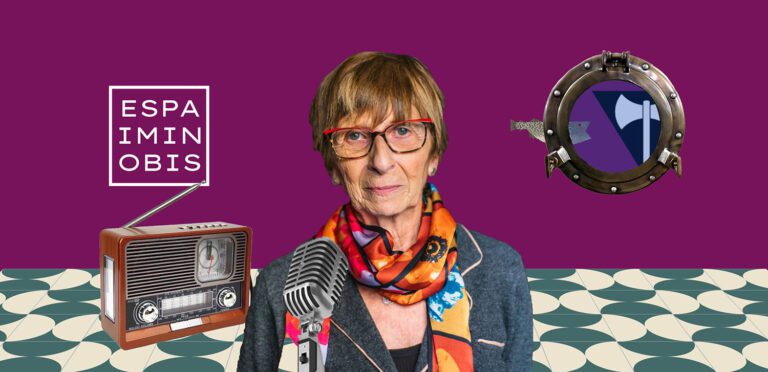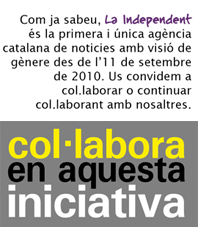
La Independent interviewed Mahnaz Rahman. She is Director of Aurat Foundation, (Pakistan), committed foundation that promotes democratic values and gender equity.
Journalist, feminist and Pakistani activist, Mahnaz has more than 40 year works for the right of the women on Pakistan where, officially, around 90% of the women suffer some kind of violence. She has been writing extensively on gender and sociopolitical issues, developing her career between Pakistan and China. In 1991 she was awarded with the “Friendship Award” for part of the Chinese Prime Minister for promoting ties between the two countries.
Mahnaz Rahman, has been in Barcelona invited to the Seminar of reflection and intercultural dialogue between Pakistani and local women , celebrated on April 25, at the Palau Macaya. This seminar is a part of the project Evolucionem juntes, a intercultural Dialogue between women of all the origins, organized by Salut I Familia association, and the collaboration of Obra Social La Caixa.
Mahnaz Rahman in Barcelona. Foto: Montserrat Sosa.
How did you star your social activism in Pakistan?
At the end of the sixties I was a young lefts-wing student and activist. I was the first woman in the economics department at Karachy University. At that time, in Pakistan, there was not presence of media, besides the state TV, but we managed to watch the BBC news, for us at on that time it was a reliable source. As a students’ movement we were aware of all the movements that happened in Europe also the decolonization’s movements on many African countries.
In Pakistan, that was also a “revolutionary” period, we could say, with massive protests against the Ayub Khan government, which end up with his reassignment. After some unstable government, we finally held the first free elections and for the first time we had a left-wing government represented by Zulfikar Ali Bhutto, founder of the PPP (Pakistan Peoples Party). There was a very exciting time for all progressive people that, where they belonged to the PPP or not. We all, the left-wings people, supported h Ali Bhutto. He was a very charismatic man
You were already aware of gender inequality, in this time?
M.R: Not yet, at least on a consciously . During these periods we did not think on feminism as a specific movement. We thought as other movements in other countries, that with the revolution (we thought we were doing a revolution) all problems caused for the liberalism, will be solved! Poverty, Peasants problems, gender problems….We had a romantic idea about it. During our meetings, for instance, Women where always the ones to prepare the tea, provide comfort, etc… to our man comrade. Those left-wing thinkers’ men did not treat us like equal at all. And they were revolutionary convinced!!
Some years later, when I joined the AURAT FOUNDATION, the founder Nigar Ahmed, she help me to understand that we, women, we have a particular problems for the fact of our gender. And here we here! 50 years next, still struggling for equality rights!!
When did you began your task on AURA FOUNDATION?
In 1979, Zia-*ul Haq, the man that executed Ali Butho, after a bloody coup d’état, he imposed a political Islamic regime with the support of the Islamic radical party. He passed the Law Hudood, ( Sharia), as we all know, condemns the women to terrible punishments for what, they consider, crimes against religion (sexual relations, adultery…). This was the beginning a Islamic theocratic state. In respond to that tyranny, on 1981 the WOMEN’S ACTION FORUM it was founded. It was on this period when I join the AURAT FOUNDATION to work for women rights.
How has been the evolution of women´s rights struggle in Pakistan?
Since then, 1981, we have had periods of what we can call “contained democracy” where the gains of ourrights have suffered ups and downs. One of our feminist leader she wrote on a book and she entitled it :” one step forward, two steps back “. Especially significant moment was on 1988 when Benazir Bhutto, Ali´s Bhutto, daughter, obtained majority at the parliament. She was 35 and the first president woman on a state with Muslim majority. After 20 months she got dismissed and she could not finish her mandate. This was her first mandate. In further elections she got elected again, and again got dismissed. In spite of these tough times, she promoted important changes and she was a great inspiration for all women.
After long period of dictatorships (whatever form it takes) is very difficult to accept a democracy. The factual powerful they are afraid of democracy.
Democracy is a culture that has to be practice day by day to be internalized. It needs time, maybe generations. Talking to Pakistan, during these periods that we can called “constrained democracy” the power has been always (and still is) behind the curtains with deep roots and tentacles, so it is very difficult to make deep changes making one step forward and two back.
In the short, but intense history of the Paquitan as a Nation, is there any period of No Islamic state?
No, it has not been possible. From the very beginning of our independence, the religious lobby has been very powerful. In spite of that, on 1958 the President Ayub Khan, that was a military relatively moderated, he changed the nation’s name for Republic of Pakistan. He received a lot pressure from the religious groups, so he finally submit to them and rename it back to Islamic Republic of Pakistan, until today.
During this political alternation between military and religious groups, the religious lobby had always the real power on the shadow, whether they are members of the parliament or not. They are a very powerful lobby and put a great pressure. The people fear them.
How this political climate affect the freedom and women’s rights?
One of the visible consequences of this influence is to see more girls covering their head. They feel pressure and probably safer. But despite that fact, when I’ m talking to I find them very open mind and strong. The students, as well as the professional, they take part in the activities as we did, but the dress code has changed. Even so, still we have come a long way. For example, the girls of my generation “we should” marry very young, therefore, we were not allowed to have higher education. High school was the ceiling accepted. If we wanted go to the University, by the time you were finished the university you were already “to old” as a standard to get married. Since the aim of the woman in the life was the marriage, that became a problem for the family and the girl. Now days this is changing among new generations; girls can have her master or PhD, and also get married. Therefore, somehow we can say is an improvement.
I understand we would be speaking of women middle-high class and some level of empowering, but what it needs to be done to reach those women that
Yes, certainly these women are the ones that suffer the most. Especially the ones that travels out of the country. They do not know the local language, so they cannot communicate, understand and get to know their right, neither where or how to ask support….They feel very isolated.
I would like to remark that there are many abusive situations that women in Pakistan suffer daily and not necessarily physical violence. To the rebel against the patriarchy society in Pakistan, does t necessarily mean that you have to leave your home. To be a rebel, it may means making your point like; want to have higher education, refuse an arranged marriage o have a job…to resist the pressure and stand up is a great victory. Of course they will have trouble and suffer social pressure, but if you succeed, is a breakthrough. Now days in Pakistan you can see girls on banks, offices,…they clear the way.
Do you think it is possible to achieve women’s rights on a religious society, whichever that may be?
Honestly, I don’t think so, well…maybe after some centuries (laugh), but so far,no.
Why?
Because as I said before, the religious power as deep root so the changes are very difficult. For instance, the language of the majority of religion is so masculine; God is masculine. Why use male gender to refer to is deity? Using the masculine form, we are reinforced the values of masculinity (the uses of power, role…) and all that determines our thought. So if we want to achieve gender equality, we have to modify every aspect on our lives; Language, thinking…our believes. For instance: I’ m a gender training so, I’ m aware of those issues, even so, sometimes I found myself saying things I should’ t say. I’ m born and rise in a particular society, so I’m affected for it. We must be aware of our social context and how we are conditioned, the social pressure and all subliminal messages in which we live under. Is very important to be aware and confront them.
That said, I personally thing that we, the leftists people, we have to try to understand the spirit of religion, so we can make arguments against them. Actually I am working in this matter. I read the translations of the Koran and other books to explode. And to show that all things are saying on the name of religion is false. We should take into account that the big majority of the women in Pakistan, do not read the Arab (language of the Koran).Therefore they do now what they are praying. That is changing.
Listen the participants in the seminar; which are the similarities between Pakistani and Catalan woman, in relation to their struggle?
I pleasantly surprise listening these Pakistani girls that are living and working here, professionals and highly educated, single mother…that is great. I think they have great potential and they can do so much good for the progress of both, Pakistani and local community. I was also impressed finding so much similarity in our demands, the legislative progress achieved. I thought that the progressive people, wherever our origins are, we all are walking in the same direction.
How do you see the future for the feminist movement on your country?
If we speak about activists, perhaps quantitatively there are not many, but they speak out. When any of our members gets out in the media, this bothers a lot those in the power. We can feel the pressure of their voices trying to silence ours. For example when, after years of struggles we get the passed a law against gender violence. As a preventive measure, the aggressor has to wear an electronic “bracelet”. Immediately the religious groups raise their voices to laud! They saying that stigmatize and insult man and so on….They do a lot of noise, But so do we.
Which is the legacy of Benazir Bhutto?
Her murder was a tragedy. A woman with a big talent, intelligence and great education. A big leader that represented us in the world. On the other hand, we all know that she was not a revolutionary. She was a liberal. If she could finish her mandates, probably she hadn’t promoted big structural changes in our society. Ideologically as a left-thinker woman, for sure, I would have a lot disagreed. But as woman and a feminist, she was a great ambassador for our struggles. A terrible loss to our nation and for the world.






